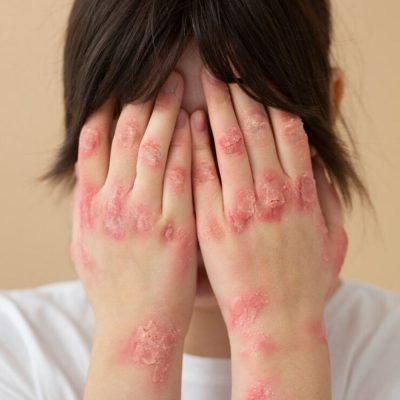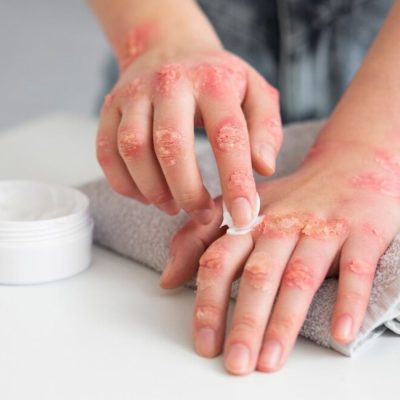Eczema
Eczema is a chronic skin condition causing the skin to become red, inflamed and itchy. It is also called Atopic Dermatitis. It is one of the most common skin conditions that affect people of all ages but is common among children. At SkinAccess Clinics, we offer specialized care to help manage eczema and improve your skin health.

What is Eczema?
Eczema causes the skin to become dry, itchy and prone to inflammation. Often, it develops during childhood and persists into adulthood, though some people may outgrow it. Eczema tends to flare up periodically and may be triggered by various environmental factors. While it is not contagious, it can be uncomfortable and at times, may lead to complications such as skin infections. People with eczema often have a family history of the condition.
Symptoms of Eczema
Symptoms of eczema vary depending on the age of the patient and the severity of the condition. In infants, eczema typically presents on the scalp, face and cheeks. In older children and adults, it more commonly presents in the hands, elbows, knees and feet. Symptoms experienced may at times be severe and could interfere with daily activities and sleep.
Some common symptoms include
1. Dry, sensitive skin
2. Intense itching, particularly at night
3. Red, inflamed skin
4. Dark-coloured patches of skin
5. Rough, leathery or scaly patches
6. Oozing or crusting
7. Swelling
8. Thickened skin in areas that have been scratched frequently
Causes of Eczema
The exact cause of eczema is not fully understood but is believed to be due to a combination of genetic and environmental factors.
Patients with a family history of eczema, hay fever or asthma have a higher tendency to develop eczema. A genetic mutation affecting the skin’s ability to retain moisture may also play a role.
An overactive immune system is believed to be a causative factor. It causes the body to respond aggressively to allergens or minor irritants.
Triggers known to cause eczema flare-ups include allergens (dust, pollen, mites, etc.), irritants (perfumes, detergents, soaps, etc.), stress, extreme temperatures and sweating.
A compromised skin barrier allows moisture to escape and irritants to enter, causing dryness and inflammation.

Diagnosis of Eczema
Eczema is diagnosed by a physical examination and a family history review by a dermatologist. Patch testing may be recommended to identify specific allergens or irritants that could trigger the condition. At times, if there is uncertainty about the diagnosis or if another skin condition needs to be ruled out, a skin biopsy may be required.
Management and Treatment of Eczema
While there is no cure for eczema, there are several treatment options available to manage symptoms and prevent flare-ups. The treatment plan is tailored to the individual case, depending on the severity, the patient’s age and their response to previous treatments. At SkinAccess Clinics, we offer a range of effective therapies.
➥ Moisturizers & Emollients: Regular use helps to reduce dryness, restore the skin’s barrier function and protect against irritants.
➥ Topical Treatments: Creams and ointments are prescribed to reduce inflammation, redness and itching during flare-ups.
➥ Antihistamines: Oral antihistamines may be prescribed to help with the itching, especially at night.
➥ Wet Wrap Therapy: This involves applying medicated ointment to the affected areas and wrapping them with wet bandages. This is done to lock in moisture and reduce inflammation. This is usually for severe cases of eczema.
➥ Phototherapy (Light Therapy): Controlled exposure to ultraviolet (UV) light can help reduce inflammation and improve skin health in moderate to severe cases of eczema.
➥ Systemic Medications: In severe cases of eczema, oral or injectable medications may be prescribed. This is done when it does not respond to topical treatments or other treatment options.
